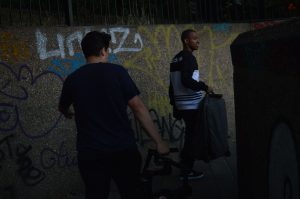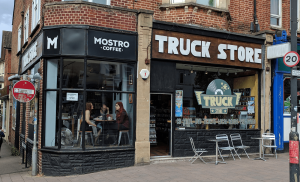Icon of the Week: Zak Machachi
by Oliver Grant | October 15, 2023
Could you please introduce yourself?
My name is Zak, I’m 25, I’m in the 3rd year of my chemistry DPhil, and I’m a trance DJ.
How did you get into electronic music?
My mum was pretty involved in the dance music scene back in the day, and so from a young age I would hear her playing a lot of jungle. That was my initial exposure to it, and my interest just grew naturally from there. I’ve always been surrounded by electronic music, whether it was grime, dubstep, house, and then slightly later drum and bass – it was always all sorts of electronic music from a young age.
How did you start DJing?
I remember when I was 14 I downloaded virtual DJ and I was enthralled by all these buttons and things moving on the screen and I thought, ‘Oh yeah, I’ll give that a go.’ I remember after that I would listen to songs on the radio and imagine what they would sound like mixed together, so that’s where it started.
What is it in particular about DJing that you enjoy?
I think the job of the DJ is to be an introvert and to love music, and those two things come naturally to me. I’ve always been obsessed with music, and I was never really able to play instruments, so for me it seemed like getting into electronic music was a natural and easy route – downloading a free programme to get started versus having to buy a guitar or something like that. Growing up, there were a lot of limitations in terms of what things I could get my hands on – whereas virtual DJ was free. And then I got my first controller for about £100, and the rest is history.
How do you go about finding new music – what’s your digging process like?
The digging process is really fun. At the moment I’m mostly going into record shops and also looking on Discogs, which is a website where you can find all sorts of weird and wonderful records. I prefer to go into record shops because you can have that human connection with someone, and you can flick through random records and find stuff that you’d never normally come across. Discogs is more refined, and you can go on there knowing what labels, artists, genre, or year you’re looking for. So I try balance the two and always look for a bargain – hopefully never spending more than £10 on a record.
That’s a very different approach to the digital age trend of finding new music through streaming a lot of it online – why do you go about this way?
Well, there’s kind of a practical reason, which is that lots of older records aren’t available digitally, so you can’t get a good clean copy without buying the record itself. The second part of it that I just find it a lot more fun going into these weird and wonderful shops and meeting all the kinds of crazy people who run them. I’ve got some fun stories from people I’ve met through that.
And chance plays a big role as well?
Yeah, for sure. It’s always about luck when you go into a record shop. You’ve obviously got your favourite places, but it always depends on what stock they have in at the time. So it’s quite exciting when you go in, it’s like ‘what am I going to come out with.’ It’s quite random which I think is quite a lot of fun.
You’re doing a DPhil in chemistry – do you ever notice any symmetry between chemistry and electronic music?
Other than the obvious stuff like track names which come from chemical influences, not an awful lot. Being a scientist does help with understanding some of the technical elements of electronic music, but in terms of the themes and the artistic side of it…perhaps, but I’d need to think about that one a bit more.
What do you make of the electronic music – and more broadly the nightlife – scene in Oxford?
When I first came to Oxford in 2019 – obviously this was a time just before Covid hit – the Bullingdon was the place to go, and Simple was the night to go to, and trying to get a ticket to that was like looking for gold dust. After Covid things shifted quite a lot, nights at Bully and Simple became slightly less of a staple, and in parallel I found myself hanging out with more sort of underground crews. One in particular is Flow Soundsystem, who have been doing a really good job flying the banner for great music in Oxford. I’m quite involved with those guys now, but when I first joined, I was joining as a fan really, and now I’m rolling with some of those guys.
Nightlife in Oxford is in a peculiar place. You’ve got a venue – Cellar – which closed not so long ago which was quite legendary. I never actually got the chance to go in there because it closed right as I came to Oxford in 2019, but people have told me a lot of incredible stories about events which took place there. So, Oxford nightlife is in a bit of a precarious position at the moment and there aren’t many good venues to host things at. But there’s also an upside to that. Things have been pushed underground a lot more. These days you often find people running parties in the woods and in the forests, and these parties are magical – they’re some of the best parties I’ve ever been to. And this is a direct result of people taking initiative and communities taking initiative – engaging in collective action. People aren’t running these parties for financial gain; they’re running it for the love of the music and to create a scene.
What do you think could be done to improve the situation for Oxford’s brick-and-mortar nightlife?
It needs to be a bit more structured and organised. I think there needs to be a dedicated space – ideally a small, intimate venue – that allows people to express art in various forms. That doesn’t necessarily need to be electronic music, but there need to be venues that allow people explore their creative side. There also need to be more late licences in Oxford. With rent increases and property prices it’s very difficult for someone to come and invest and start somewhere like that – but Oxford is desperately calling out for it. As I said, people are doing parties in the woods and in abandoned buildings, and that’s great, but we can have both of these things. It’d be great to see more of a push for more venues popping up in Oxford.
Following on from what you said earlier about creating a scene, you’ve been very involved in running the Electronic Music Society – do you want to talk a bit about that and what that’s been like?
I was very fortunate. When I came to Oxford in 2019, I got involved in Electronic Music Society and Michael Diamond was running it at the time. There were social events, and they were organising groups going down to nights at the Bullingdon. At the time I sort of dipped in and out, and prior to that I was involved in electronic music societies at my previous University, so I had a kind of familiarity with it. When I came back to Oxford in 2021, I spoke with Michael, and I was fortunate enough to sort of inherit the society. The framework was transferred over so that we could start up again after Covid. It was very fortunate in that sense to have something which was already established and that had a decent following. In the first year, the main mission was to get it back up and running again. We put on open-deck events, some beginners’ workshops, that sort of thing. And out of that we attracted people of all sorts of ages, we had students and non-students; it became a much wider community than some more traditional University electronic music societies. So really I was just very fortunate and blessed to be surrounded by so many people who are curious about this electronic music thing. Eventually it became this self-sustaining society where people are running things themselves. And now I’m really excited to see some of what’s coming up and what’s going to happen with the society this year.
I think one of the striking things with the Electronic Music Society is how successful it’s been at turning a groupchat into a community – what role do you think community plays in dance music in general?
When dance music lacks community, you end up with a series of isolated people going to events, and what ends up happening is you get lots of events which are basically purely financially motivated. People are going as individuals and they’re not really having this sort of collective consciousness about the music. And that’s fine, that’s awesome if that’s what people want to do, but I think what we set out to do is create something which Oxford is severely lacking, which is a space and a community for people who are passionate about electronic music, where they can share their ideas and their hobbies with others. And from this you get so many good ideas and so many good relationships. So that was the thinking behind it. It was always meant to be a community driven thing, a collective driven thing – decisions are usually made through consulting everyone and discussing things as a wider group. That’s the way it has been and the way it should be.
What’s next for you?
My plan is to carry on working with the various communities and groups I’m involved with and have had the pleasure of working with. Whether that’s working with Flow Soundsystem or with some of my mates in London who are doing some events there. Of course, driving Electronic Music Society forwards, trying to provide new and exciting ideas for that. And then also some personal projects of my own, which involve an EP which is coming up and should hopefully be released fairly soon.
Do you have any advice for people who are maybe thinking about starting DJing or for those who have just begun?
Be curious – I think that’s the best thing I can say. Be curious about what kind of music is out there, be curious about the kind of equipment you want to use, be curious about what kind of blending you want to do. Remember that everyone starts from somewhere. Be patient with yourself and take it slowly. And have fun – that’s the main thing – it’s always meant to be fun. It’s always a long a journey and it takes a long time to get to a stage where it feels like second nature, but it’s such a rewarding hobby and you meet so many cool people through it.
As a man in the know, is there anything exciting coming up in Oxford this term which you’d recommend to our readers?
Yes, definitely. There will be two Flow events happening in Bridge in November, on the 11th and the 25th. Martian Moves are going to be playing those same nights as well, so there will be a nice diverse range of music – whether it’s the vinyl- only Flow guys or some more upbeat and fresh stuff from the Martian Move lot, it’s going to be a night of crazy good music.∎
Words by Oliver Grant.




